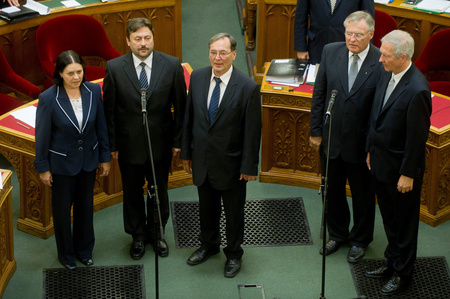Judge Mária Szívós Orders Original Sentence of Pretrial Jail

The Metropolitan Court as second instance court
30.AJC.1355/2010/02.
The Metropolitan Court as court of second instance in Budapest on the 26th of May 2010. held Council meeting gives the following
order:
In a criminal organization that committed a particularly large financial detrimental misappropriation of funds and other felony criminal offenses against Mrs. Szalai Dr. Eleonóra Szilágyi and her companions, at the Budapest Police Headquarters Defense of Economics Department under pending criminal case cc. No. 01000-3023/2009. the court in the Central District Court of Buda dated on the 17th of May 2010 changes the order No. 15.IJC. 1017/2010/2, orders I. and II. accused pre-trial detention, which to the first-instance court during the trial preparation decision to be taken, at most, from carrying into effect last for a month.
The provisions relating to the house arrest the second instance court ignored.
In respect of Miklós Hagyó III. accused suspect, affirmed.
Rationale:
The first instance court I. and II. accused suspects pre-trial detention for ordering the prosecutor petition has rejected, and against suspects ordered house arrest until the decision to be taken by the first-instance court during the trial preparation, at most until the 17th of June 2010.
Miklós Hagyó III. accused's pre-trial detention the court of first instance has ordered, until the decision to be taken during the trial preparation, at most until the 17th of June 2010.
Against the order; in respect of I.-II. accused suspects, the prosecutor announced an appeal in order to impose pre-trial detention, while the defense counsel of III. accused suspect, because of ordering the pre-trial detention, in order to release.
In the written reasoning of appeal, Miklós Hagyó III. accused suspect's pleader presented, that the reasons for the imposition of pre-trial detention does not exists. A justified suspicion is not established. From the particular reasons of the danger of escaping and hiding argues against, that the suspect lives in an organized family and personal conditions. The physical weight of crime in our opinion does not justify the imposition of the most severe coercive measures. The proof proceedings endeavor frustrating the successful in turn actually have sought to influence the process of proof. He knew about the procedure for several months, and he did not escape, he did not want to leave abroad. Reside prohibition or imposition of house arrest has been suggested. The suspect's defense counsel emphasized that suspected suffers a number of illnesses.
The appeal on the part of the prosecutor was thorough, while III. accused suspect and the defense's appeal is unfounded.
The first instance the court’s course of the decision to impose coercive measures have been adhered by the Cp. 211.§. (4) based on the investigating judge rules of procedure. Complying with the obligation to give reasons has analyzed the current state of criminal proceedings, the soundness of the prosecutorial proposal, and the content was right according to the position that the imposition of coercive measures has no procedural law obstacle in respect of Miklós Hagyó III. accused suspect.
The defender's written appeal, submitted in response to the court points out, that in criminal proceedings throughout the investigation the investigating judge, the available may contradict each other, or in any other manner in relation to the probative value of the evidence cannot be considered, cannot be compared and such a conclusion cannot be recorded due to acts of reflection. This is particularly important in cases where at investigative documents contradictory evidences are available.
The Metropolitan Court as second instance court
30.AJC.1355/2010/02.
Undoubtedly and in obvious case of course, cannot be excluded, that the investigating judge of the marked factual evidence to draw conclusions for the absence of justified suspicion.
The court of first instance was wrong when took that position, that the pre-trial detention requested by the prosecutor that the written unusual reasons of Cp. 129.§. (2) paragraph b./ and c./ points, hiding and escape, well as the risk of the evidentiary procedure endeavor frustrating the successful is not such degree, which would justify to the imposition of the most severe coercive measures in respect of I. and II. accused.
According to the court of second instance, in the case of all three suspects, the pre-trial detention in the Cp.129. § (2) paragraph B) point actually exist. In respect to Miklós hagyó III. accused suspect, there is data that the suspect wanted to leave abroad. The court of second instance wishes to point out that in the ongoing criminal case not only the escape, or the risk of hiding supports this condition of pre-trial detention. The Cp. 129. § (2) paragraph (b) point it is stated, that in regard to the risk of absconding or hiding, or from other reasonable grounds to presumed that at the procedural actions his presence otherwise is not secured. In this last round from the investigative documents indeed, without a doubt can be established, that the reasonable suspicion subject of criminal offense extremely diversified, possess complex personal and physical correlations, it assumes substantial financial background, and therefore its detection and exposure is social interest. There cannot be a doubt not even in the smallest extent that is founded on this fact reasonably be inferred, at least at this stage of the proceedings - that at the procedural action the presence of suspects can be provided only by applying of coercive measures. According to the court of second instance to achieve desired goals with pre-trial detention at the current stage of the proceedings with application of milder degree of coercive measures unavailable despite the settled personal circumstances of I. and II. and Miklós Hagyó III. accused suspects.
As the court of first instance also correctly relied at the current stage of the procedure - when the full perpetrators circle are still under exploration, in the case of I. and II. and Miklós Hagyó III. accused suspects there is a risk that in case of letting them free by influencing witnesses, by destroying material evidences or other means would jeopardize the evidentiary procedure based on Cp. 129.§. (2) paragraph c./point.
Because what is written in Cp. 129.§. (2) paragraph c./point, to determine may take place in such case, where the expected behavior is capable to frustrate evidence, or make it more difficult. In particular, at the initial, exploration stage of the procedure, it may have a paramount importance, that between suspects and other persons the flow of information to be limited to the greatest extent possible. This goal is fully consistent with the coercive measures essential to the procedural nature. Alone any behavior (such as "the collusion") is not suitable to frustrate the evidence, or make it more difficult. However, the opposite is also true: any behavior can be limited by the complete withdrawal of personal freedom that to the other datas of the procedure, the stage of the investigation, the circumstances of the offense and other additional aspects taking into account is capable to effect negatively the objective substantiation. This is indicated by full clarity the referred measure "in particular .." use of the word.
Part on those grounds lawfully and error free came to the conclusion the first instance court, that regarded to Miklós Hagyó III. accused suspect only the most stringent application of coercive measures to ensure the effective conduct of the procedure.
However according to the opinion of the court of second instance, the house arrest at the current stage of the investigation the risk of endeavor to frustrate the procedure cannot be eliminated, but it cannot reduce the degree of hazard, in respect of I. and II. accused suspects.
The Metropolitan Court as second instance court
30.AJC.1355/2010/02.
The application of pre-trial detention is always only at the most necessary cases that may take place, however, its use cannot be ignored, if desired goals of pre-trial detention cannot be provided with application of milder degree of coercive measures.
Excessively overriding public in seeing in the history of the Republic of Hungary resulting unprecedented loss of state assets, reaching the level of economic decision-makers corrupt activity, accurate, fair and full exploring, reasonable suspicion to subject suspected of criminal acts of all its members, participants in the criminal prosecution.This smooth conduct of investigative activities suspects involved in these acts requires a complete deprivation of their personal freedom.
The court of second instance opinion is, that with regard to I. accused, is absolutely necessary for the imposition of the strictest coercive measures - not only in respect of Miklós Hagyó III. accused. It is not enough to impose house arrest in order to be present at the procedural action, and that the procedure is to be completed successfully.
In response to the appeals the second instance court emphasizes that what is written in Cp. 129.§: (2) paragraph c./point, appraises the free protection the interests of the special investigative restrictions. Therefore, within the scope of the following specific reasons it can be that exceptional reference, which in the activity of proving guilt "prefer"* the acting authorities against the rights of the accused, and to this end, it allows even the complete deprivation of personal freedom. In this case therefore that reason strongly exists, to maintain the coercive measures related to public interest, despite the presumption of innocence is greater than the respect for individual freedom of prescriptive rules.
(European Court of Human Rights case law reasoning)
Regarding the nature of the coercive measures, despite the will of the person taken certain measures restricting civil rights, which aims to ensure the success of the procedure. The nature of the coercive measures at all times entails the restriction of the right, it is therefore necessary the collision of citizenship rights with the procedural interest.
However the diseases of II. accused, and Miklós Hagyó III. accused suspect, reassuringly treated at Tököl PE hospital, where necessary their care in other hospitals are also provided, so it does not violate either human rights and Fundamental for the Protection of Rome Convention, neither the Constitution provided in 70/D. § constitutional principles related to physical and mental health.
The second instance court, on the Cp.131. § (3)paragraph in the light of I. phrase, on Cp. 21 §. (3) paragraph, as well as based on the Cp. 371. § (1) paragraph, order of the court of first instance approved with regard of Miklós Hagyó III. accused suspect.
The (3) paragraph of Cp. 215.§., as well as based on Cp. 372.§. (1) paragraph, changed the order of the court of first instance and the defined period of time in Cp. .l31.§.(l) paragraph, has ordered I. and II. accused suspects pre-trial detention.
Budapest, 26th of May 2010.
Dr. Mária Szívós
- President of the Chamber Judge Rapporteur-
Dr. Mrs. Szelényi Dr. Erzsébet Roszik Dr. János Szolnoki
-Board member Judge- - Board member Judge-
In witness whereof: Mrs. Szabó


